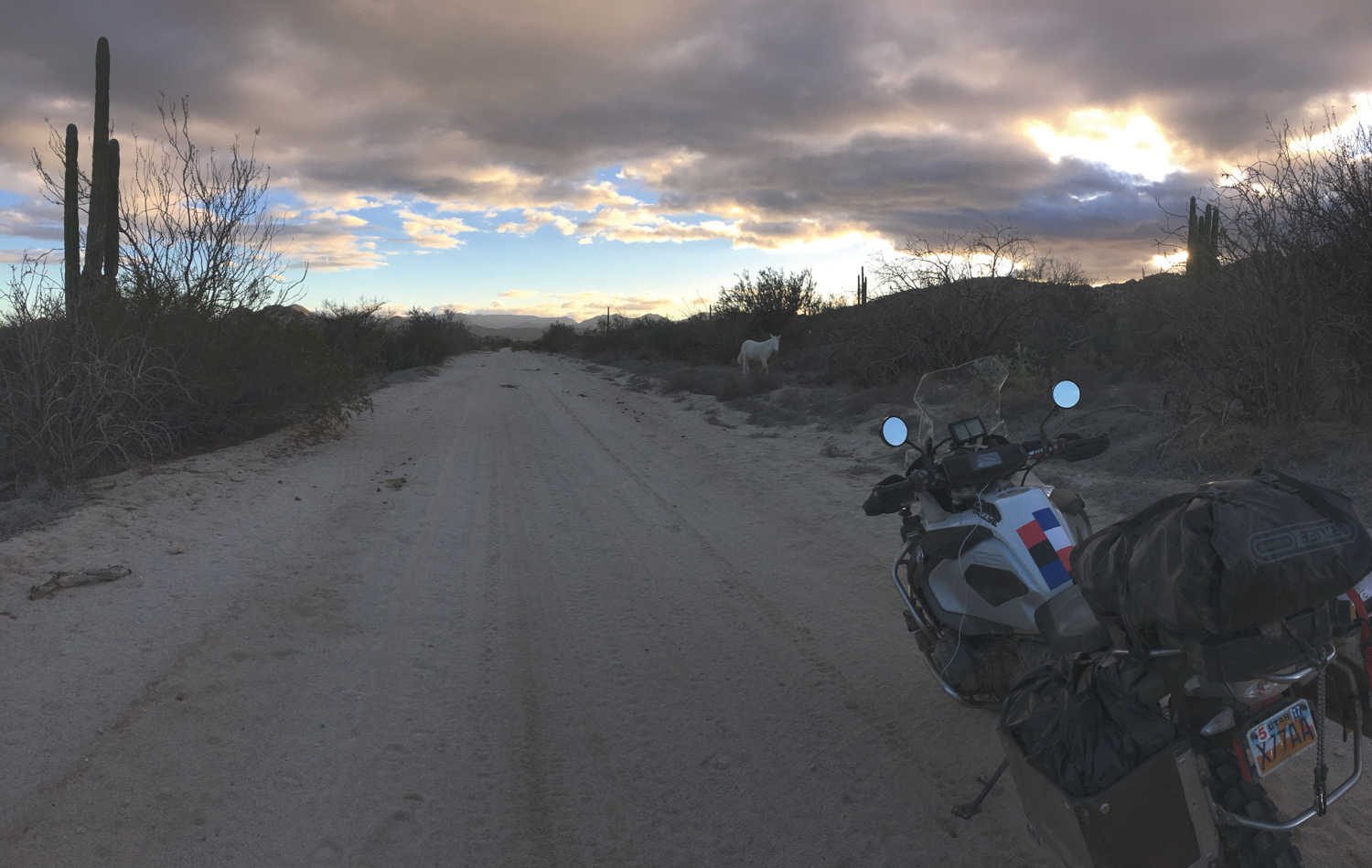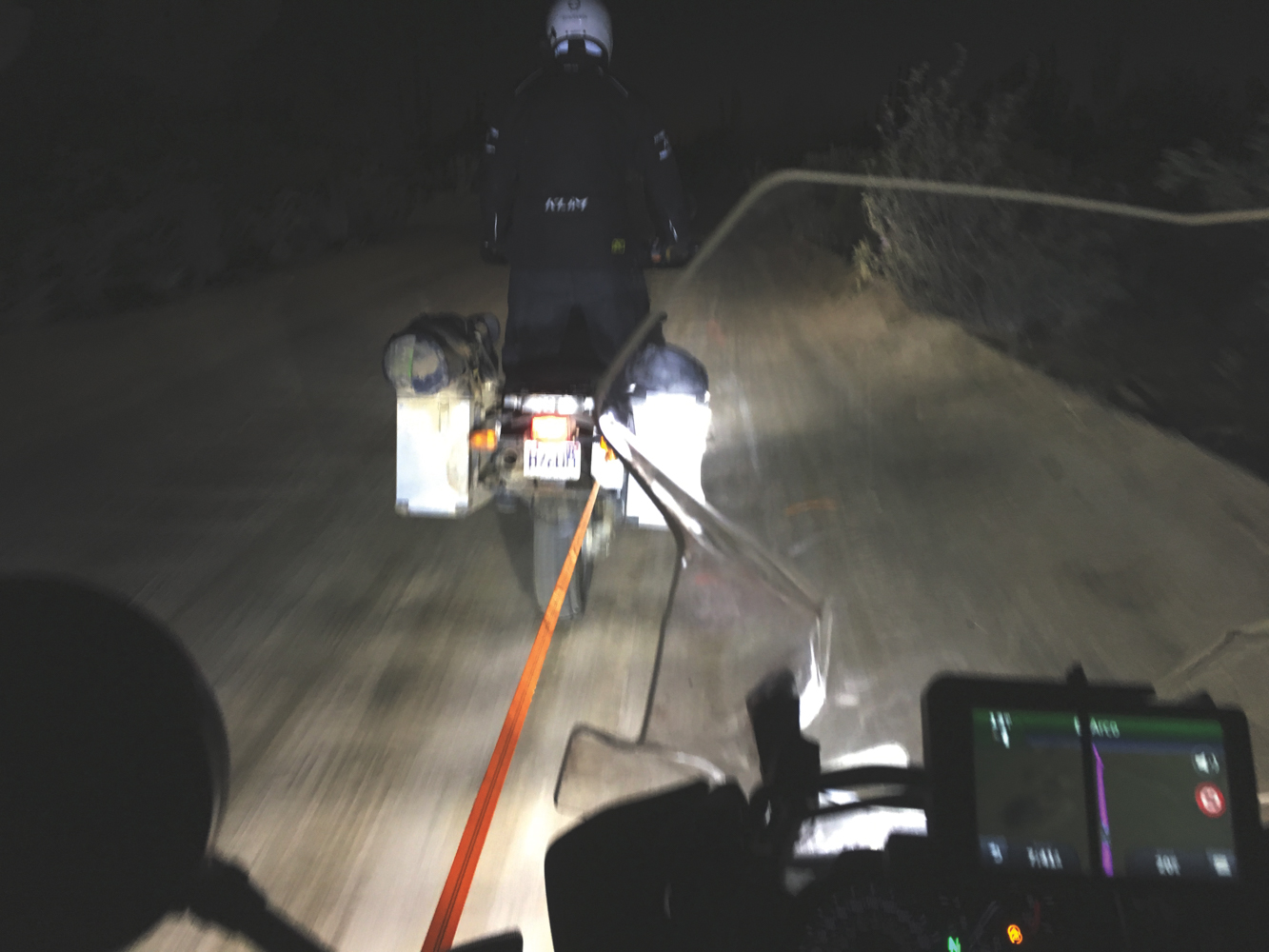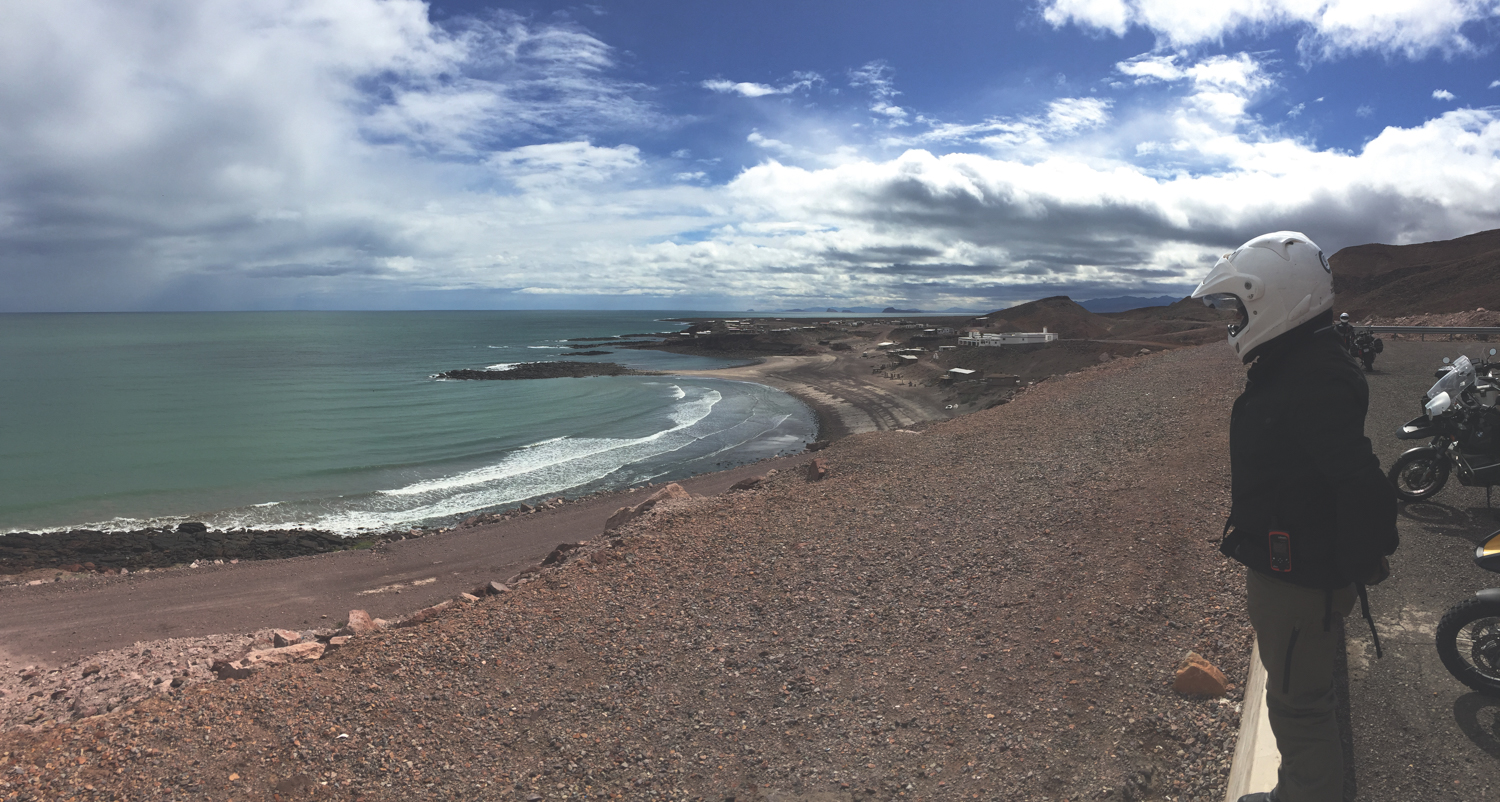Editor’s Note: This article was originally published in Overland Journal, Spring 2018.
Dusk is settling into the hills along the Sea of Cortez. The sky is a bruised purple, still streaked with veins of red and yellow, a reminder of the brilliant but difficult day behind us. Our band of friends rides west leaving the coast behind, crisscrossing the invisible border between the northern and southern peninsula. Although we don’t know exactly where we are in relationship to the line between Baja Norte and Sur, the idea of us being time travelers sits well with me, crossing time zones with each turn in the road. This is our fourth day in Baja on the big bikes, and everything is five by five as they say in the communications world. But that was before cellular networks and the Internet. Now, the old ways are mostly forgotten, antiquated, and to many, useless.
We entered Mexico outside of Yuma, Arizona, at a small town called Los Algodones—a crossing that even Google Maps didn’t recognize. The transition from one country to another was stark and immediate. At 4:30 p.m. we were eating at a ubiquitous hamburger chain; 4:45 p.m. found us witness to the poverty of the third world. Sidewalk taco stands on every corner, a dead dog in the gutter. That is a distant memory to me as I stop in the middle of a remote dirt road in the arroyo of Baja. It was then—now— when I knew something was happening. It is impossible to tell if this feeling is metaphysical, magical, or something altogether ominous; in the end, it is all of those. If you can’t accept the bad with the good, and perhaps learn something from it, you shouldn’t be on a bike. Or in Baja. Or anteing up in the game of life, maybe.
A white horse stands in the middle of the dusty road looking at me as if he had been waiting for this. It is a moment which rests easily with me. It is peaceful, even for just a moment, and then I remember the old apocalyptic verse from Revelation—something about the pale horse with death written on it, hell following close behind. The sadness comes quickly, sharp and metallic, but it is there in my throat.
Jason is behind me, likely wondering why I’ve stopped until he sees it himself. The white horse looks from me to Jason then exits stage left, allowing us to pass. The valley before is painted a fiery gold in the evening sun and, all at once, the feeling is gone. I check the mirror to see if Jason is ready to go, and he is. I pin the throttle feeling the rear end of my BMW adventure bike twist angrily but perhaps with some amount of pride. The bike corrects, and within seconds I’m in fifth gear, going 60 mph along the dirt road as the cirios plants blur in my vision.
Tron and LeMega are ahead of us. I gave them an ample head-start since LeMega had been complaining about the state of his KTM 1290 Super Adventure. The bike is brand new, but problems—real or imagined—exist nonetheless.
This is the Valley of the Cirios, a designated vegetation and wildlife area of Baja where the cirios plant grows; its wiry neck stretches tall, yet bends as it reaches farther into the sky. Among these brilliant desert plants one will also see ocotillo and cardón, which at night appear as men standing in prayer in the earthly shadows of sunset.
I ignite all four of my HID driving lamps and the valley floor bursts into color of a different kind, the evening sky cured with a bright and artificial whiteness—the clinical and antiseptic light of a physician’s office. I pass a ranch to my right and can tell, even at high speeds in the dirt, that someone has loved it, and I smile. I am consumed by the ride—by the light, smells, and oncoming shadows of the evening— then I concentrate on the inevitable water crossings in the road created by the recent rain. I lose track of Jason and stop, waiting with one eye in my mirror looking for the lights of his bike. When I don’t see him, I make a slow, wide turn; then I hear the rumble of his boxer engine before I see any light.
I pop the clutch, twist the bars, and the rear wheel spins hard turning the motorcycle 180 degrees—a fast turn which I’m not always capable of. It goes well, but I do not anticipate the uneven road. My inseam is short, and I find quickly that my left leg cannot hold the bike upright after the turn. At a standstill, my rig goes down on the left side, dismissing me into the mud with impunity. The bike, as it falls, compresses the rear suspension like a guitar string and then lets go; the harsh snap echoes in the night as the entire weight of the machine releases. This tug-of-war between potential and kinetic energy proves too much for the driveline, and immediately after this low-drama, low-impact get-off, I hear a strong, pronounced grinding from the rear end and I know my trip is over.
I am right. My ride is over. Yet, something within me knows there is more to the story, even then. And there is—a lot more. I want to tell you everything turned out okay, that we were at peace with the setback. But after spending a night in a defunct copper mine in the hills of Baja, the dank smell within an abandoned school house, the feeling that the hills have eyes, and an early morning border crossing before the break of day—yeah, there’s more. I felt it closing around me like a rusty cage.
The bike lay in the mud like a rotting corpse. According to our map (and we always carry physical maps), it is 12 miles to the next town. Unfortunately, these maps do not tell us general population or services offered, but we are hopeful that the town has something to offer. Jason and I agree we have to soldier on to El Arco, yet the question of how hangs in the air like an unwanted spirit. I grab a tie-down and stretch it out. There are 4 feet of woven fabric between Jason’s 1150GS Adventure and my bike—we both shrug knowing it is the best we can do. Twilight is upon us; the vast arroyo seems void and uncaring in the growing darkness. I touch the DeLorme device on my hip wondering if tonight is the night I call in the cavalry, then I dismiss it, and we begin an hour-long tow to El Arco.
If you’ve never been towed behind another motorbike in the dead of night through the Mexican desert, you’re missing out. There is one basic rule to towing: the front guy is the gas, the rear guy is the brake. As simple as it sounds, the reality is different. As Jason pulls me through each water crossing, I can’t help but feel I’m riding pillion on Satan’s sportbike. I have no control, but I see everything coming at me. I am powerless but persist. The moon rises behind us. It is so heavy I wonder if it will burst, scattering glitter below as a final goodbye, but as if defying several of Newton’s laws, it keeps climbing. My windscreen is coated in mud and fatigue is setting in. Jason is doing his level best to keep it upright which he manages with only one exception: his crash is also low speed and bends part of his luggage rack, but not badly. I can tell he is exhausted and a little frustrated; to his credit he says nothing.
Jason is tall and unassuming. He doesn’t talk too much and, by his demeanor and 15-year-old bike, no one would assume he is a world-class rider. In truth, he might appear more of a Starbucks adventurer or weekend warrior at best. Yet, in the few rides I have done with him, I am always impressed. Not only does he always come prepared, but he is able to tackle the fastest, most twisty, gnarly trails Tron and I have delivered to him—and he does it without reservation. He is the very definition of reliable, and to watch him sitting in the mud breaks my heart.
He gets up, and we both look over the sad state of our affair: one bike down in the mud; one upright and non-working. The soulless moon rises higher like a ghost, silently rattling an invisible chain at us, all-knowing and uncaring. Together we lift the bike from the mud and proceed down the road. I glance at the odometer and know we are close to El Arco; I look for lights but darkness remains. We continue without reservation as we have nothing else to do. Turn, mud, straight, turn, water. Heavy with fatigue, the tow begins to feel like a video game to me, the music piped into my helmet. It is the third act of Neil Young’s “The Old Laughing Lady,” and the women are singing now, upfront and personal as if the organ is an afterthought in the distance. The singing is more like howling, wordless and haunting and altogether magical.
Then I see the lights, though there are too few to give me any hope. One of them moves, some alien ship turning without sound or meaning, and then the rumble of the exhaust catches up—some kind of delay between the speed of light measured against sound. It approaches, and I do not need to see the bike or the rider to know it is Tron, a man with whom I have ridden tens of thousands of miles.
It takes only a minute to exchange our war stories, and Tron shrugs. We make our way to El Arco and find an old Mexican caretaker. Speaking broken English, he leads us to the schoolhouse where children of the mine workers used to attend class. It is a long, two-room building with a rickety door and bird droppings along the floor matching the outline of the rafters above. The steward tells us he will shut the lights off at 9 p.m. sharp—he seems very insistent on this matter. Tron agrees, and the man leaves but stops briefly to tell us he can haul my bike to Guerrero Negro in the morning. It is a kind gesture, and I am deeply grateful, but also overwhelmed as reality sets in.
I grab the DeLorme from my hip and send a message to my emergency contacts (my lovely wife and my badass desert racing brother). Unbeknownst to me, my brother is stranded in his jalopy snowcat at our cabin in the Uinta Mountains in northern Utah. I laugh a little since it is the anniversary of my dad’s death. It is a bitter laugh, and I wonder if Dad isn’t teaching me a lesson.
It is 8 p.m., and the landscape goes dark—the blackness so infinite and limitless in depth that it is almost supernatural. We chuckle, thinking the old man can’t tell time, but the mistake is ours: we are in Baja Sur now, and this part of the peninsula runs on Mountain Time.
We lay out our beds in the school then walk outside to look at the night sky. It is here, Dear Reader, when I saw things I cannot describe accurately. Normal starry nights leave me feeling small and insignificant in our universe. But here—tonight— the sky isn’t over us but we are in it. The world seems domed like a planetarium, and the stars above are unnaturally bright. Standing there I know that space above us is real and tangible— molded from molten slag, black as a crow’s wing, but cooled too quickly in the primordial time leaving gaps for light to pour through. I am in the stars and it is embarrassing— embarrassing that I am so affected by it. Hill dwelling mutants or thieves are but a distant idea as I sit under God’s own mirrorball and feel less alone, less worried. Not just about the broken bike, but about life and how little money means to me and how real everything is that we once thought only as metaphysical.
We wake the next morning, all safe, and the steward reneges on his offer to take us into town, telling us he can only deliver us to the highway, no further. I hear the word federales many times and figure the man is living here on the lam.
We put the enormous motorcycle in the back of his ancient Toyota pickup which has, unbelievably, a 6-foot bed. Together we roll west toward the highway, sunrise chasing us. I give him what I can, about 700 pesos, and he drives away.
I am in the Hotel Malarrimo in Guerrero Negro and it seems to be the hot spot for adventure riders. All of them bemoan my state of brokenness but without exception they each armchair diagnose my bike. I know it is the final drive. Well, the shaft—the shaft for sure—since I can hear the splines spinning where they should’ve connected to the final drive.
BMW roadside assistance won’t help me since I am in Mexico. My Mexican travel insurance arranges a tow, but it’s 4 days out. I am in despair again and think of Kerouac looking for Dean’s father on Larimer Street saying, “Down in Denver, down in Denver/All I did was die.” In an instant, all I could do was die.
In the meantime, I insist my friends soldier on, that they continue south toward San Ignacio. There is no reason for their trip to end with my bad luck. They abide, and it is a bitter goodbye for me.
I arrange a tow, and for the next 12 hours I head north in a truck, passing military checkpoints and small villages along the way. There is one music CD in the truck and it plays on repeat; very little is spoken between the driver and me.
We arrive at San Ysidro at 0200 hours. We find two locals, and together the four of us push the bike over the bridge; they then let go, and I hop on the coasting bike. I throw all my paper pesos at them and yell “VIVA ZAPATA!” They holler back, perhaps with some arribas thrown in, I don’t remember. The old man working the border looks at me and my bike— both filthy—with somber eyes. He scans my passport and waves me through. I ask if he wants to search the bike and he shakes his head, “No, man, just get ’er home.”
I wait for an hour in the Jack in the Box parking lot with the junkies and the destitute. There is a contrast here, but I am too tired to recognize it. The wrecker comes, and we drop the bike at BMW San Diego around 3 a.m. I watch from the wrecker as we drive away, the bike sitting there, and all at once it is over. Perhaps it is catharsis or even something stranger, but I am safe, even if it’s unceremoniously and alone.
Four hours later, the phone rings in my motel room. It is my biggest client (day job) telling me they’re being absorbed by venture capitalists, and just like that I lose half my income. An hour later, I walk the 2 miles to the BMW dealer and find three men looking over my bike on a hydraulic stand as if it’s a body in a morgue. The rear end is dismantled showing the rusted knuckle of the final drive. The technician launches an unfounded accusation of mistreatment as the service manager scowls. The coordinator is customer-facing and more genteel, but it’s too late. There is a lot of discussion about warranty and logistics, and the dealership is mostly unsympathetic.
I rent a car and drive to Las Vegas to see my in-laws. A week later I am back home in Utah, and then I hop a plane back to California. The owner of the dealership collects me at the airport, and we talk during the ride. He apologizes for the cold reception last week and then tells me my bike is complete, but he doesn’t advise me riding it since it needs even more work. This is horrible timing since I just landed in San Diego, and I wonder if he owns a phone. Bent handlebars, loose shift lever, iffy brakes—all of these items I had checked before the trip and were fine.
After much discussion at the dealership, I tell them to keep the bike. I would’ve put it down had it been an animal— my rig didn’t deserve the agony. BMW corporate reaches out. They take pity on me and tell the dealership to set me up. Another 3 hours and I leave on a 2017 BMW R1200GS Rallye, a bike that was in the crate from Germany that very morning. I ride it to Vegas, then home to northern Utah. The bike is light compared to the Adventure model, nimble and powerful. My problems disappear with each mile though I still lament my doomed trip. But soon those memories fade as the lone highway stretches on, Neil Young in the helmet. Everything is five by five.





